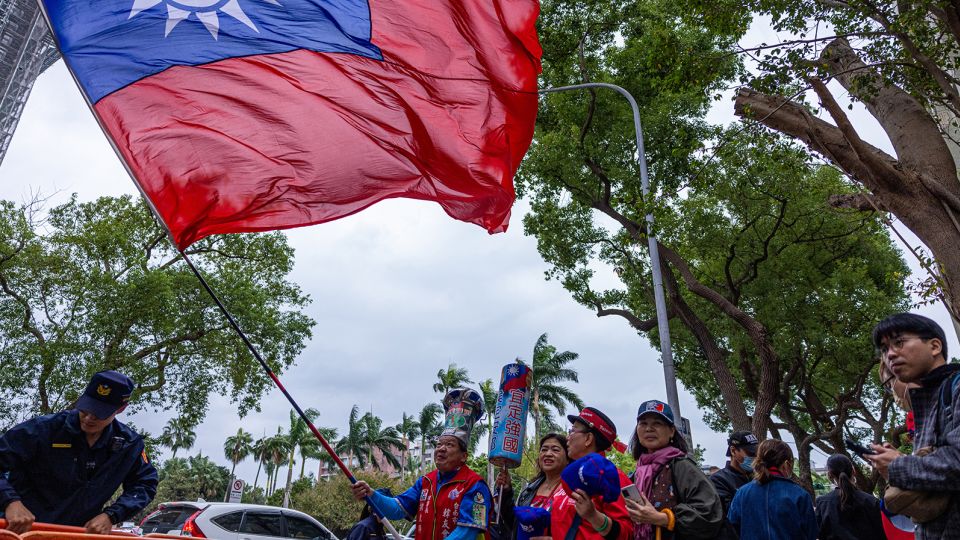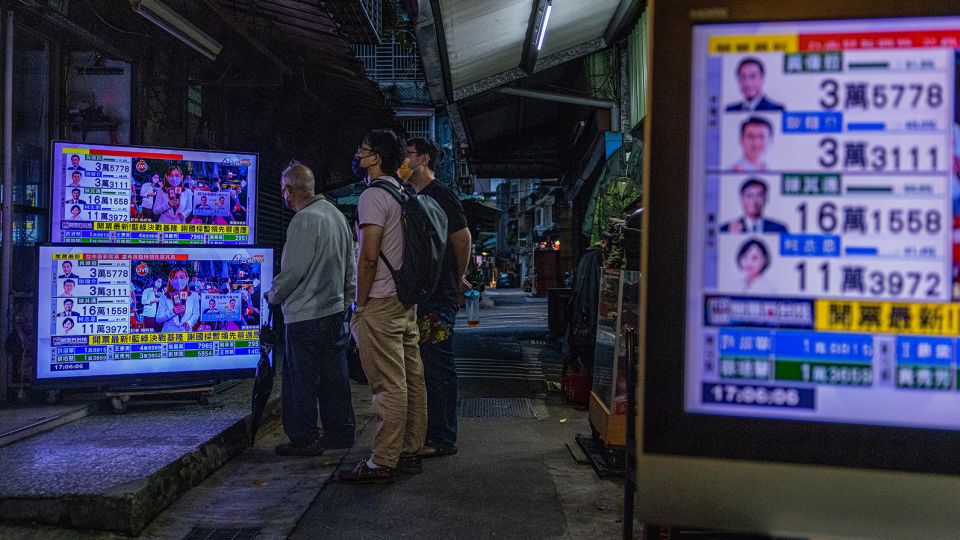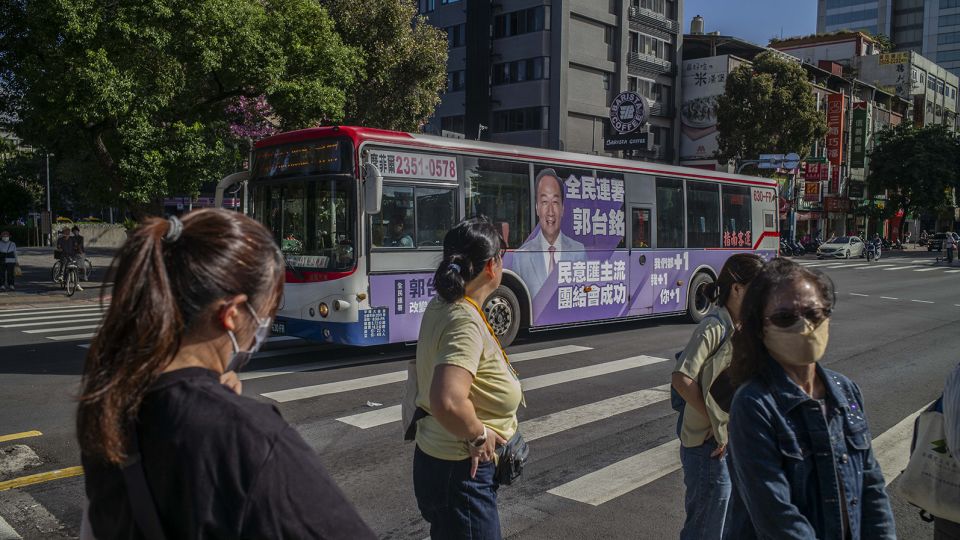At the height of the Covid-19 pandemic, Taiwanese citizen Nancy Hsieh received a message from her relatives online: To stop the virus from entering your lungs, all you need to do is drink lots of water with salt and vinegar.
But she knew immediately this was false information.
Right beneath the original message on Line, Taiwan’s most popular messaging app, a chatbot replied that the claim was not supported by science, with a link to an article that fact-checked this erroneous information.
The chatbot, Auntie Meiyu, is one of multiple Taiwanese fact-checking applications that have increasingly gained prominence, as the island democracy of 23.5 million people steps up its readiness to combat the rising flow of false information from circulating within society.
Besides unscientific methods of treating Covid, Hsieh recalled “Auntie” debunked other rumors such as a fake speech attributed to an official from the Ministry of Economic Affairs, misrepresentation of polling results, and fraudulent food safety reports.
Experts say fact-checking mechanisms like this are becoming more important, especially as Taiwan is set to choose a new president in a highly consequential election next month.
The vote comes at a moment of high tensions as Beijing ramps up military, political and economic pressure on the island that China’s ruling Communist Party claims as its own territory, despite having never controlled it.
Like many places in the world, Taiwan often sees an uptick in disinformation during elections. But it is also uniquely targeted outside of voting season because of the precarious geopolitical space it lives in.
According to a report by Stockholm University’s Varieties of Democracy Project, published in March this year, Taiwan for the 10th consecutive year received the greatest amount of disinformation from outside its borders, highlighting the need for effective fact-checking mechanisms on the island.

A supporter of Taiwan’s opposition KMT waves a giant national flag in Taipei on November 24, 2023 – Annabelle Chih/Getty Images
A growing security risk
Disinformation is something Taiwan’s security agencies are particularly alert to.
At a recent closed-door security briefing attended by CNN, Taiwan’s intelligence community warned that China has been working to influence Taiwan’s upcoming election through a series of disinformation, military and economic operations, with the goal of boosting the chances of opposition candidates who favor improving ties with Beijing.
According to Taiwanese intelligence, Wang Huning, the fourth-ranking leader in th Chinese Communist Party, recently convened a meeting to coordinate efforts to influence the election, while reducing the likelihood that external parties could find evidence of such interference.
“They hope that the party they dislike will lose the election,” a senior Taiwanese security official, referring to the ruling Democratic Progressive Party (DPP), which views Taiwan as a de facto sovereign nation and has prioritized elevating Taipei’s ties with Western powers since taking office in 2016.
The candidate for DPP, Vice President Lai Ching-te, is currently leading in the polls, and is openly loathed by Chinese officials.
Lai is ahead of two other candidates – Hou Yu-ih from the Kuomintang party and Ko Wen-je from the Taiwan People’s Party – who are seen as favoring closer relations with Beijing.
Among the different strategies deployed by Beijing, Taiwan believes China’s cognitive warfare operations – which included spreading disinformation in Taiwan and magnifying talking points that favor China-friendly candidates – are the most sophisticated, multiple officials said at a closed-door briefing on security affairs attended by CNN.
Besides operating content farms and fake accounts on social media, the officials alleged that China’s information operations are multifaceted.
Other tactics used by Beijing included working with private companies to impersonate genuine news websites, handpicking soundbites that fit Beijing’s narratives from Taiwanese television programs and repackaging them into short social media videos, and illicitly funding small news organizations in Taiwan that mostly report on local livelihood issues but also occasionally post content that cast doubts toward candidates unfavorable to Beijing.
One piece of disinformation highlighted by officials was a recent rumor that Hsiao Bi-khim – the DPP’s vice-presidential candidate and until recently Taiwan’s top representative in Washington — is a US citizen.
Fact-checking reports, including from the Taiwan FactCheck Center – one of the most prominent news verification groups on the island – indicated that while Hsiao used to hold US citizenship, she had renounced it in 2002.
Besides spreading rumors, Beijing has also been exerting pressure on Taiwanese businesses with investments in mainland China to toe the partyline, and luring Taiwanese politicians with discounted trips to mainland cities in an attempt to generate support for candidates lobbying for closer ties to Beijing, the officials claimed.
CNN has reached out to China’s Taiwan Affairs Office for comment.

Local TV news broadcasts local elections amid tensions with China on November 26, 2022 in Taipei, Taiwan. – Annabelle Chih/Getty Images
False flag warnings
China’s attempts to sway Taiwanese voters haven’t always been successful.
Ahead of Taiwan’s first direct presidential election in 1996, Beijing fired missiles toward the island to intimidate voters not to support a candidate championing Taiwan’s separate identity from China. That move backfired spectacularly and the candidate, Lee Teng-hui, swept to a landslide victory.
Outgoing Taiwanese President Tsai Ing-wen, who is from the DPP and cannot run again because of term limits, was frequently the target of angry warnings from Chinese officials. But Taiwanese voters handed her two consecutive terms in 2016 and 2020.
News literacy experts say China’s cognitive warfare operations against Taiwan have long been happening beyond election seasons.
Puma Shen, an associate professor at National Taipei University who specializes in researching disinformation, said researchers can often establish a link between a disinformation campaign and the Chinese authorities by analyzing IP addresses of the accounts that propagate the rumors and whether they are automated.
“China’s public opinion war is often aimed at influencing independent and young voters,” said Shen, who is running to become a legislator with the DPP.
But Taiwanese security officials cautioned that China’s disinformation operations could go beyond undermining trust in the government.
According to a Taiwanese security document obtained and reviewed exclusively by CNN, authorities are investigating an incident in the summer, during which they believed China may be training for a “false flag” operation – one that could be used to justify a future military attack against Taiwan.
The incident took place in July, when a Beijing-friendly Taiwanese newspaper falsely claimed that Washington had ordered Taipei to develop biological weapons that could be used against China’s People’s Liberation Army.
According to the security document, the rumor initially appeared in fabricated “meeting minutes” that claimed to show discussions between senior Taiwanese officials regarding the fictitious project, which was subsequently passed on to a local reporter.
Both Washington and Taipei have refuted the claim that Taiwan was developing biological weapons, and there is no evidence the discussions took place. The Taipei District Prosecutor’s Office subsequently launched an investigation into the journalist over allegations of forgery.
A Taiwanese security official told CNN authorities had high confidence that Beijing was behind the fabricated document, because it contained some terminologies commonly used by the Chinese Communist Party that are unfamiliar to Taiwan.
As the false report generated outrage in mainland China, the Chinese military simultaneously sent more than 100 warplanes into Taiwan’s self-declared air defense identification zone over the next three days – a significantly higher number of incursions than usual.
“We believe this goes beyond just spreading disinformation,” the security official said. “Beijing seems to be practicing how it could use disinformation [to create] an excuse for military action… and target Taiwan [militarily] using a justification that the United States was about to start a war against China.”
The official added that the unusual combination of a disinformation campaign and heightened military activity has raised alarm among Taiwan’s intelligence community that Beijing could be training for a “false flag” operation – and to use the outrage it would generate as justification for a potential future military attack on Taiwan.
China’s Taiwan Affairs Office did not respond to a request from CNN for comment on the fabricated document allegations.

A campaign billboard featuring Foxconn Technology Group founder Terry Gou on a bus in Taipei, Taiwan, on Wednesday, November 1, 2023. – Lam Yik Fei/Bloomberg/Getty Images
News literacy
The growing threat of disinformation – and its potential implications on Taiwan’s democracy – has highlighted the need for effective fact-checking mechanisms in Taiwan to help citizens debunk false information in everyday life.
Chen Pei-huang, a senior journalist at the Taiwan FactCheck Center, said while their newsroom hires about a dozen reporters, they are outnumbered by the vast amount of false rumors circulating online.
“For us, besides simply fact-checking a piece of information, we think it is important to promote media literacy… because if most people have the ability to question the authenticity of a piece of information, then it will be harder for rumors to circulate.”
This is where apps like Auntie Meiyu can help.
Unlike other fact-checking applications, which generally provide an interface for users to manually insert and verify text or a website link, the chatbot can be enabled in group chats or direct messages on Line and has the ability to automatically scan messages and warn of any potentially misleading content.
“A lot of people tell us that it really helps a lot, because sometimes they wouldn’t dare to directly tell their parents or relatives that this kind of information is wrong,” said Cecile Chen, who runs the chatbot under Gogolook, a Taiwanese tech company specializing in call-filtering services. She also emphasized that the chatbot has an apolitical background.
Hsieh, from Taoyuan city, said her elderly relatives now feel embarrassed whenever Auntie Meiyu warns that their messages contain misleading information. As a result, she said, they have learned not to forward every message they get before considering its truthfulness.
“For my elderly relatives… if they can pause and suspect whether a piece of information they received is really accurate, I think this is already great progress for them,” Hsieh said.
As for Chen, the fact-checking journalist, his work goes beyond simply verifying the authenticity of what people see online.
“If we can provide people with accurate information and statistics, the public can learn that while we can disagree on different issues, we must base our opinions on solid evidence,” he said.
For more CNN news and newsletters create an account at CNN.com
News Related-
The best Walmart Cyber Monday deals 2023
-
Jordan Poole took time to showboat and got his shot blocked into the stratosphere
-
The Top Canadian REITs to Buy in November 2023
-
OpenAI’s board might have been dysfunctional–but they made the right choice. Their defeat shows that in the battle between AI profits and ethics, it’s no contest
-
Russia-Ukraine Drone Warfare Rages With Dozens Headed for Moscow, Amid Deadly Winter Storm
-
Trump tells appeals court that threats to judge and clerk in NY civil fraud trial do not justify gag order
-
Can Anyone Take Paxlovid for Covid? Doctors Explain.
-
Google this week will begin deleting inactive accounts. Here's how to save yours.
-
How John Tortorella's Culture Extends from the Philadelphia Flyers to the AHL Phantoms
-
Tri-Cities' hatcheries report best Coho return in years
-
Wild release Dean Evason of head coaching duties
-
Air New Zealand’s Cyber Monday Sale Has the 'Lowest Fares of 2023' to Auckland, Sydney, and More
-
NDP tells Liberals to sweeten the deal if pharmacare legislation is delayed
-
'1,000 contacts with a club': Tiger Woods breaks down his typical tournament prep to college kids in fascinating video
